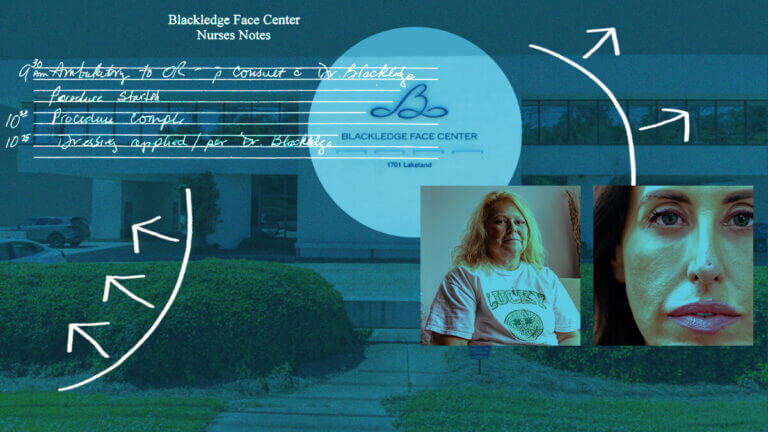
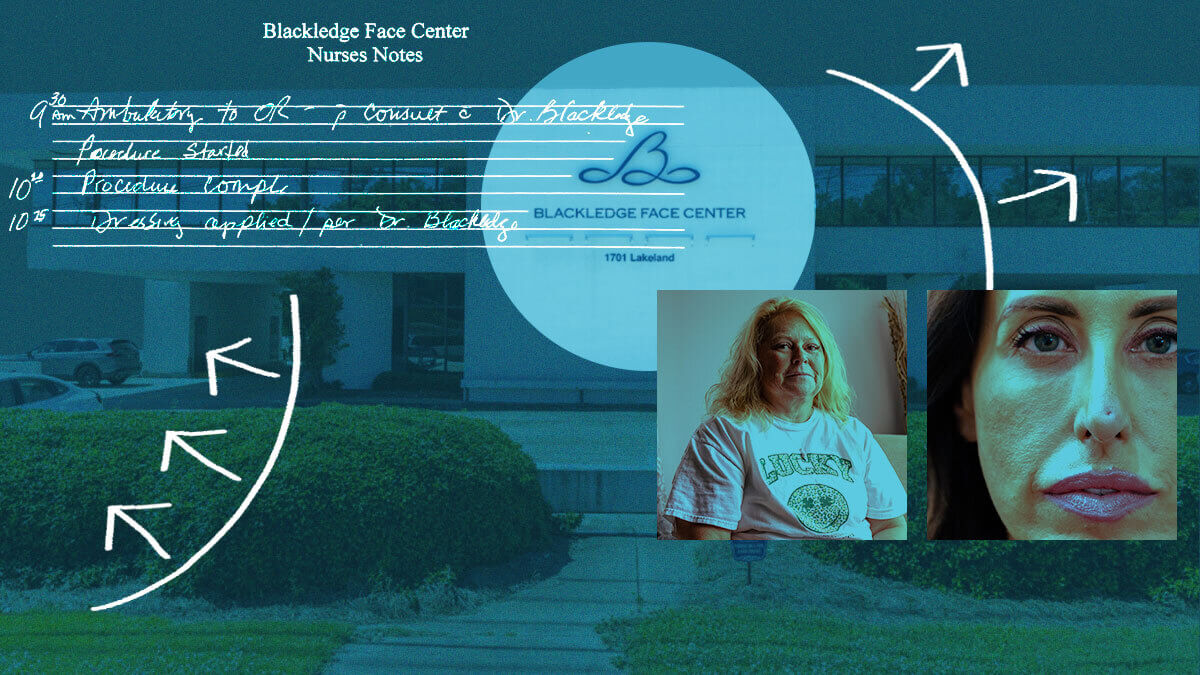
After years of being ridiculed for her prominent nose, Marisa Hankins decided to undergo plastic surgery.
“My whole entire life, I was made fun of for it,” said the 44-year-old hairstylist from Biloxi.
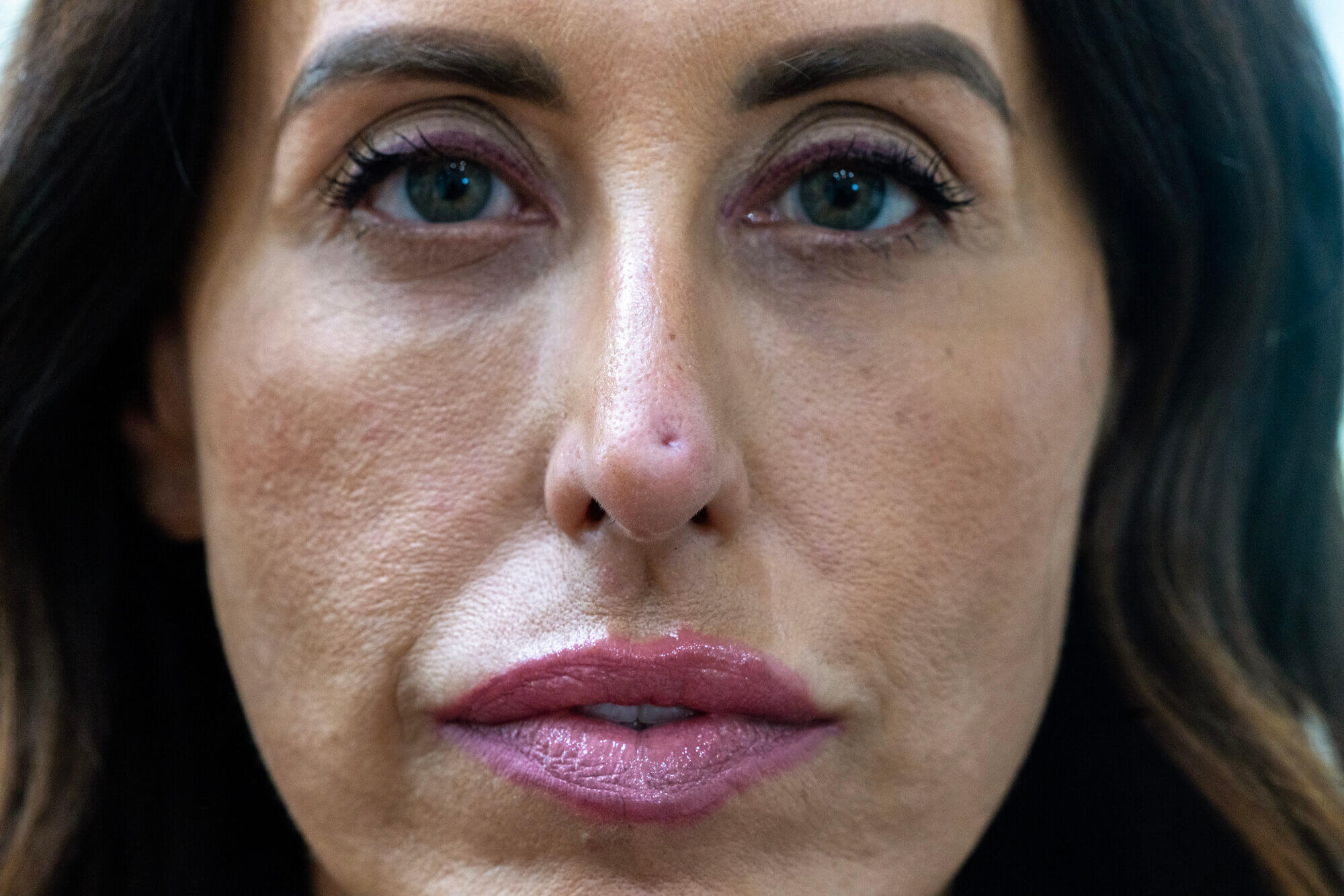
But the relief she felt after the 2021 rhinoplasty was short-lived. Less than a year later, a stitch inside her body ruptured through the skin’s surface and the area below it caved in, leaving a dimple at the end of her nose.
Her surgeon, Dr. Adair Blackledge of Blackledge Face Center in Jackson, offered to correct the issue – going as far as volunteering to drive three hours to Biloxi on a weekend to look at it. But Hankins said she decided she didn’t feel comfortable receiving further medical care from him.
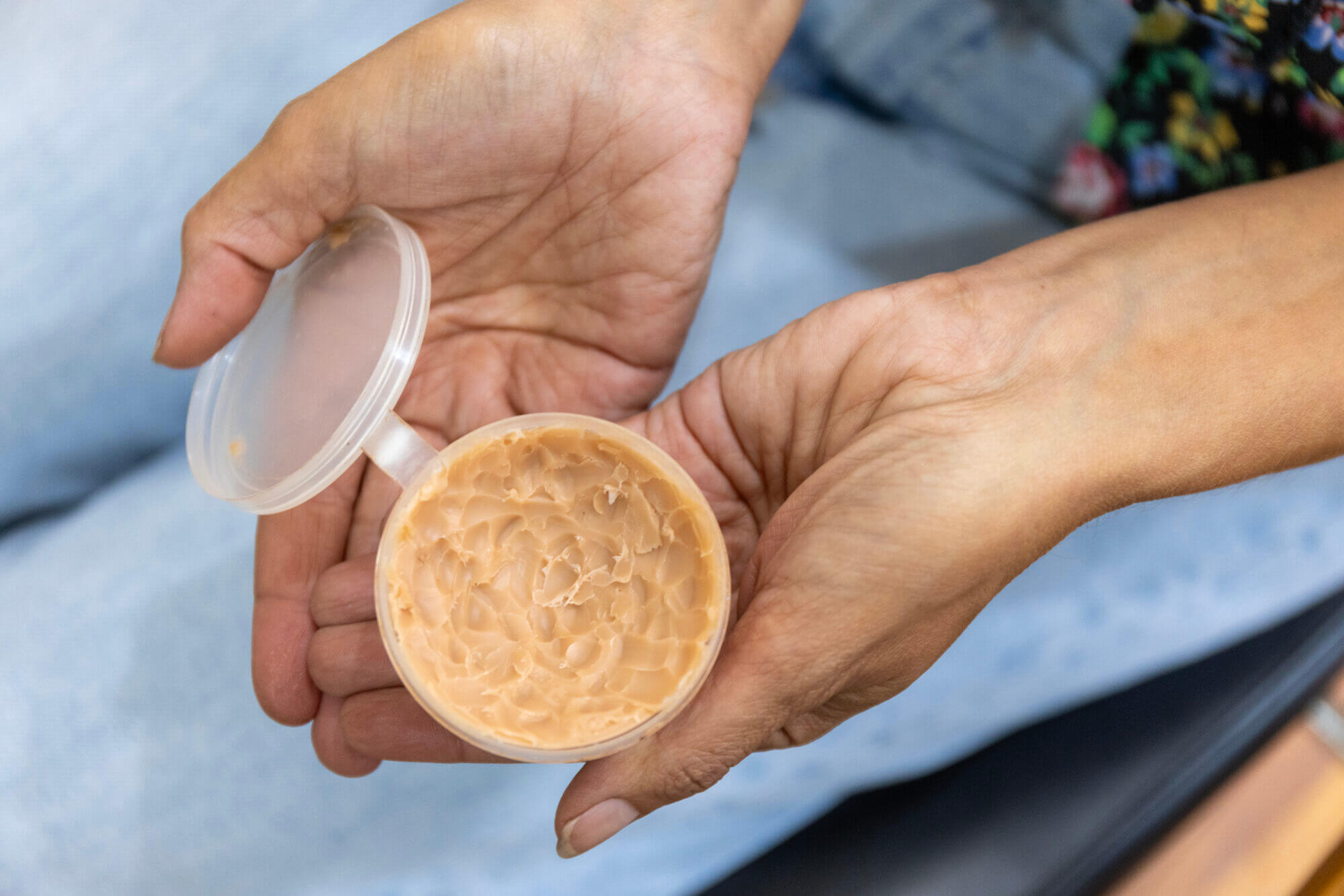
Hankins was wary of some aspects of her surgery, she said — how rushed the procedure felt, the oral sedative medications she was given that did not kick in until after surgery was over, and the “excruciating pain” she felt taking out her stitches using the staple remover Blackledge sent home with her. She had already returned to Jackson twice for minor issues.
“It was a very valuable lesson in vanity,” said Hankins, who uses movie special effects makeup to cover the cavity.
“You go there to get something fixed that you don’t like about yourself,” she said. “And then, they make it worse.”
Hankins is not the only patient who has voiced concerns about the care Blackledge gave. In interviews with Mississippi Today, six others said they experienced prominent scarring or sought medical attention for wounds or complications after surgeries performed by Blackledge. They recounted quick procedures, results that didn’t last and repeated revisions, or procedures to correct or improve past surgeries.

Mississippi Today spoke to other patients with similar concerns who declined to be named because they did not want people to know they had cosmetic surgeries or said they felt embarrassed.
Blackledge, a well-known facial plastic surgeon who has practiced in the Jackson area for 22 years, told Mississippi Today for months that he could not locate a written transfer agreement he said he had with St. Dominic Hospital in Jackson. Such an agreement is a state requirement for surgeons who sedate their patients in their offices, and an agreement is widely considered a critical patient safety measure for office-based surgery.
The agreements lay out a plan for transportation and treatment of patients at a hospital in case of medical complications or emergencies.
Meredith Bailess, a spokesperson for St. Dominic Hospital in Jackson, said on Aug. 20 the hospital did not have a transfer agreement with Blackledge Face Center and was unable to locate an older agreement.
Blackledge provided a written transfer agreement with St. Dominic to Mississippi Today on Tuesday, signed that day, after Mississippi Today inquired about it for the third time in three months.
He has not faced any public disciplinary action by the Mississippi Board of Medical Licensure, the state agency that licenses and regulates physicians.
Over the past year, Blackledge has faced an onslaught of patient complaints on social media. Some patients, including Hankins, said they believed they were uniquely unfortunate until they discovered online that others had similar experiences.
In emails responding to questions from Mississippi Today, Blackledge described the past year as a “social media barrage,” in which he, his family and his staff members have been attacked and threatened by patients.
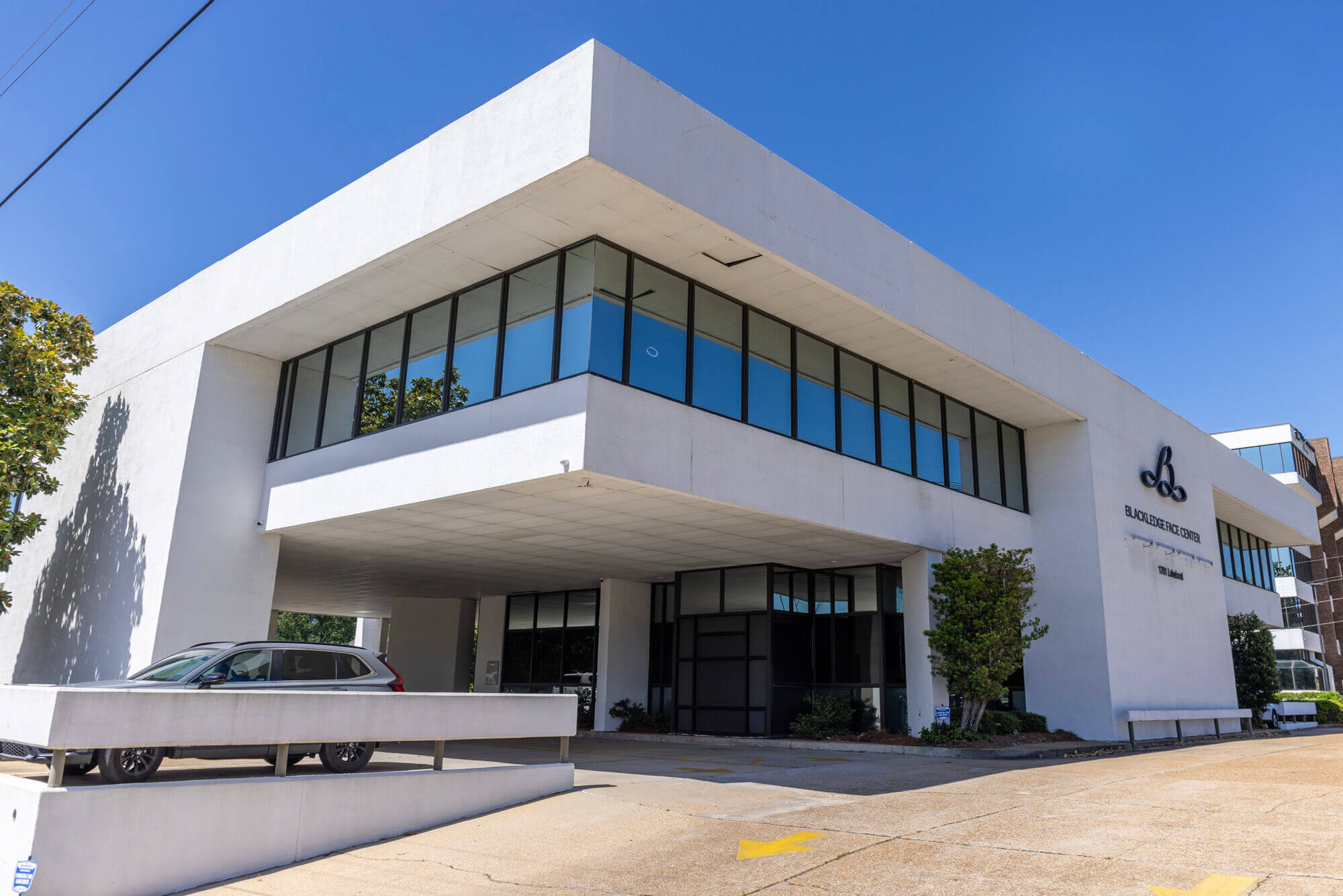
“I believe that what set all this off was a person who considered herself a social media influencer who was initially positive and then turned negative and began the frenzy against me,” he said.
Blackledge said he believes the treatment he provided to the patients interviewed for this article met the standard of care expected of a facial plastic surgeon, and emphasized that they represent only a small portion of his patient population.
“The past year has been an extremely frustrating one for me, and I really feel like I am being painted in a false light by patients who had apparently unreasonable expectations of the results that could be achieved,” he said.
Blackledge said his commitment to patient privacy has prevented him from responding publicly to accusations made about his practice, but he does his best to treat every patient the way he would want a physician to treat him or a family member.
“When you contacted our clinic, it was actually a relief to me that I would finally be able to tell a limited version of my side of this story,” he said to Mississippi Today.
Blackledge’s training and credentials
There are few requirements for doctors to practice facial plastic surgery in Mississippi. Across the U.S., licensed physicians are given the leeway to practice any specialty of their choosing.
Some opt to gain additional, elective credentialing to certify their training in a specialty field. About 90% of U.S. physicians opt to become board certified, which requires that doctors complete an accredited residency program, pass an examination and do continuing education throughout their careers to maintain their certification.
Board certification is not required, but some experts argue it is an important measure to consider when choosing a plastic surgeon or assessing their qualifications.
Blackledge began his career with a residency at the University of Mississippi Medical Center in otolaryngology, a surgical subspecialty focused on the ears, nose and throat. Part of the program was devoted solely to facial plastic and reconstructive training, he said.
Some otolaryngologists, or ENTs, go on to practice facial plastic surgery, which is itself a subspecialty of otolaryngology. But Blackledge said he chose not to pursue board certification in otolaryngology because he was advised to distance himself from the field when he was starting out as a facial plastic surgeon.
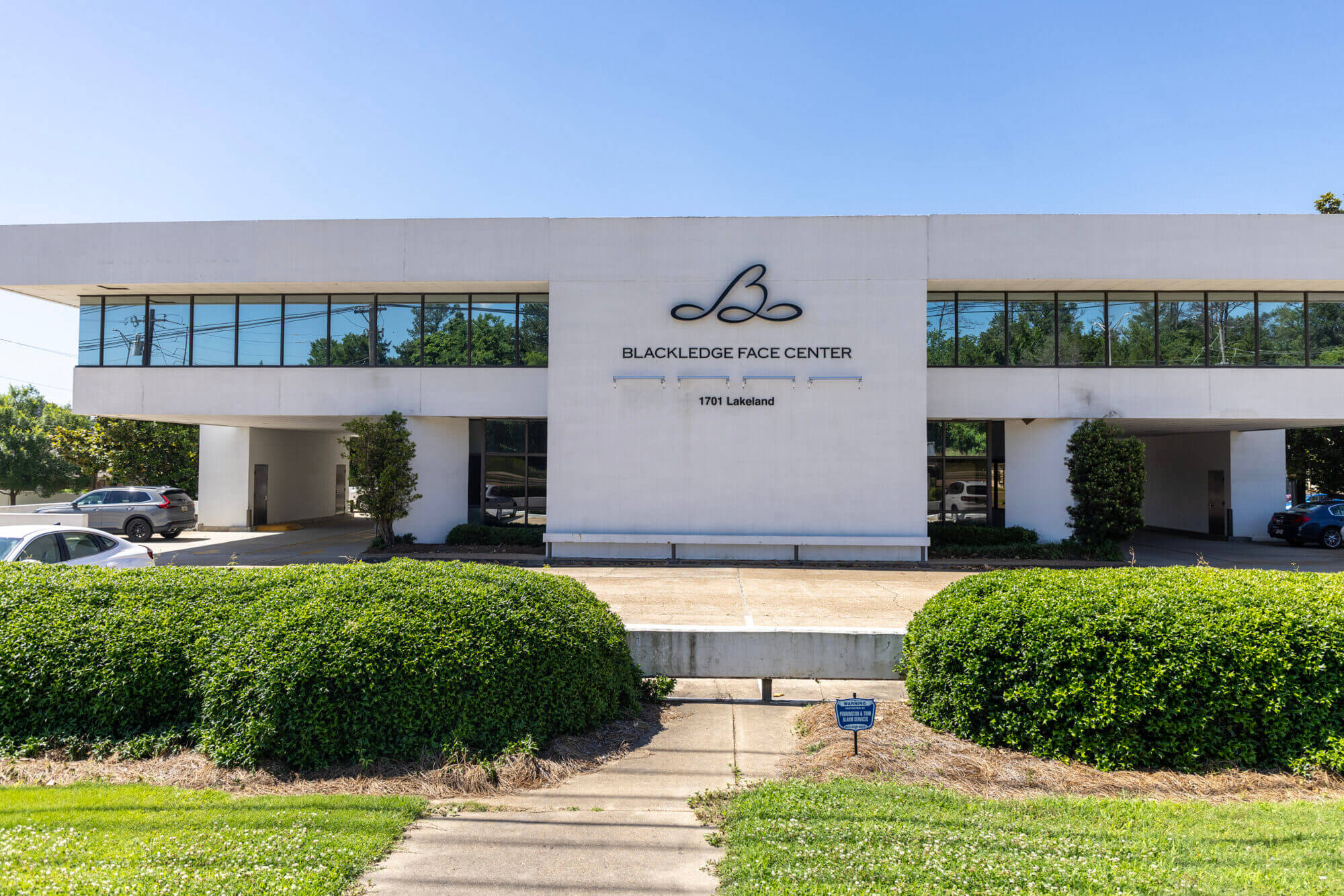
“I simply am not an otolaryngologist and do not think it would be fair to the field of otolaryngology or myself for me to be board certified in that field,” he said, citing the fact that he has not inserted ear tubes, performed a tonsillectomy, removed head and neck cancer or performed sinus surgery since his residency.
Board certification improves patient safety by showing that a doctor has trained extensively in a field and demonstrated they are capable of performing certain procedures, said Dr. Ben McIntyre, a professor of plastic surgery at the University of Mississippi Medical Center and the director of its plastic surgery residency program. McIntyre is board certified in general surgery and plastic surgery.
“Physicians, we have a great duty to practice good medicine, safe medicine, and not harm patients by not doing things that we’re not approved or credentialed to do or have no training in,” McIntyre said.
McIntyre, like all of the physicians interviewed for this story, spoke generally about plastic surgery, but did not comment on Blackledge’s practice.
The Mississippi Board of Medical Licensure administrative code states that physicians performing office-based surgery “must be able to document satisfactory completion of surgical training such as Board certification or Board eligibility,” neither of which Blackledge holds. The board did not respond to questions about what other certifications are acceptable.
Blackledge said his residency and fellowship training clearly document extensive training in facial plastic surgery. He advertises himself as a fellowship-trained facial plastic surgeon.
Blackledge spent the year after his residency doing a fellowship in facial plastic surgery with Dr. E. Gaylon McCollough of Gulf Shores, Alabama.
He said he took and passed the American Board of Facial Plastic and Reconstructive Surgery examination in 2003 after his fellowship, but he did not gain the credential because applicants must first be certified in otolaryngology or plastic surgery. Both fields are recognized by the primary organization that certifies specialty boards in the U.S., while facial plastic surgery is not.
Physicians must also submit a record of at least two years’ clinical experience and 100 operative reports for peer review in order to become board certified in facial plastic and reconstructive surgery.
Blackledge said he also shadowed Dr. Frank Kamer of Beverly Hills, California, for two weeks in 2003.
He returned to Jackson in 2003 to practice facial plastic surgery with Dr. George J. Smith of Faces PLLC. In the early years of his career, from about 2003 to 2009, the company’s website represented Blackledge as a board-certified facial plastic surgeon, according to web archives of the page.
Blackledge told Mississippi Today he was unaware the website represented him as such and had no part in its development. In 2009, his practice and Smith’s separated. Smith died in 2023.
There are few regulations guiding what procedures a doctor can or cannot perform in their office or what credentials they must hold, said Dr. Heather Faulkner, a board certified general and plastic surgeon and associate professor at Emory University School of Medicine who chairs the American Society of Plastic Surgeons’ patient safety committee.
Many hospitals and insurance companies require doctors to be board-certified to gain hospital privileges or register as providers. But neither is required for office-based, elective surgeries paid in cash, she said, which places the onus on patients to evaluate doctors’ training and certifications.
“There’s a hard stop (in hospitals), but in a private office, there’s no hard stop there,” Faulkner said. “And there’s no law that says that you can’t practice a specialty that you’re not trained in.”
Speedy surgeries, no general anesthesia
From his office on Lakeland Drive, Blackledge performed 719 surgeries in 2024, according to a post on his Instagram page. He told Mississippi Today that he has performed 12,000 facelifts and rhinoplasties – a pace of at least two such procedures per working day – in his 22-year career.
Courtney Sampson, now 42, traveled from Colorado for a deep plane facelift focused on the lower cheek and neck with Blackledge in 2024. She was surprised by the time it took Blackledge to complete the procedure – about an hour and 15 minutes, according to medical records she shared with Mississippi Today.
The deep plane facelift, a procedure that has risen in popularity in recent years, repositions the layer of fat, muscle and fascia below the skin by releasing it from retaining ligaments. Doctors describe it as an aggressive technique that yields more natural-looking results than traditional skin lifts but carries risks due to proximity to facial nerves.

Patient records show Hankins’ rhinoplasty and a facelift, which were performed in one sitting, took 65 minutes total. Other patient records reviewed by Mississippi Today showed a neck lift completed in 40 minutes and facelift and brow lift in an hour and 20 minutes. Each procedure involved different techniques and parts of the face.
It takes the average plastic surgeon a little over four hours to perform a facelift, said Dr. Alan Matarasso, a board-certified New York plastic surgeon and president of the Plastic Surgery Foundation, a research and education organization affiliated with the American Society of Plastic Surgeons.
Three other plastic surgeons interviewed for this story estimated that the average facelift takes about four to five hours.
Blackledge said there is no way to compare the amount of time a facelift takes to another because each one involves different techniques and areas of the face. The patient’s weight and age, staff’s skill level, whether general anesthesia is used and whether a surgery is a revision are all factors that influence the amount of time a procedure takes.
A procedure like Sampson’s, which was focused on the lower cheek and neck, can take less time than a full facelift, he said.
Blackledge said he was taught that taking more than two hours for a facelift suggests a lack of technical skill and can lead to more complications. He said he believes he is well above the “average plastic surgeon,” both in terms of where he trained and the number of procedures he has performed, adding that ENTs who focus solely on facial plastic surgery may be more efficient than plastic surgeons who perform other procedures.
“I do not believe that there should be a specific time it takes to perform a facelift,” he said.
Blackledge performs major surgeries, including facelifts, without general anesthesia. He instructs some patients to remove their staples themselves. For patients who have traveled to Mississippi, he does post-operative visits at their hotel rooms.
Some surgeons employ these practices, but they aren’t common, said McIntyre, the director of UMMC’s plastic surgery residency program.
Blackledge said he prefers not to completely sedate his patients so they can follow commands and move their mouths during surgery, which allows him to see tissue position and avoid important nerves. He said he administers local anesthetics where he plans to make incisions, and in a minority of cases – about 10% – he inserts an IV, primarily for fluids.
The medical community is divided on the safety of this method. Some plastic surgeons say this method can be safe, while others caution against it for complex procedures, like facelifts.
“Most surgeons are going to want to do (facelifts) in an operating room under general anesthesia,” McIntyre said. Operating on the face poses risks of nerve damage and bleeding, he said, and sudden patient movement could lead to injury of the mouth, nose or throat.
Matarasso said general anesthesia is not always necessary for procedures like facelifts, but recommended monitoring by an anesthesiologist for patient safety and comfort.
Blackledge said he believes general anesthesia increases the likelihood of risks, complications and dissatisfaction because a plastic surgeon can’t determine if he or she is getting close to nerves or if the surgery is causing asymmetry when a patient is unresponsive. He said it also has a greater risk of injury to the throat.
Several patients told Mississippi Today they chose Blackledge’s practice specifically because he does not use general anesthesia.
Blackledge uses a sleeping pill and a sedative, anti-anxiety medication – Ambien and Valium – to sedate most patients before surgery, a drug combination he said he has used his entire career.
The regimen “provides pain control while allowing the patient to be conscious and responsive as well as relaxed in which could otherwise be a harrowing experience,” he said.
McIntyre warned that combining sleeping pills with sedatives could dangerously depress the central nervous system. The combination can be difficult to control because the absorption of oral medications varies by patient, and the effects can peak after surgery – when patients are no longer being monitored – potentially making it difficult for them to breathe.
Dr. Gianfranco Frojo is a board-certified Virginia plastic surgeon currently serving as one of the directors of The Aesthetic Foundation, the research arm of The Aesthetic Society, who has studied the use of oral sedation and local anesthesia for a limited facelift technique.
He said he does not recommend using oral sedation for complex procedures, like deep plane facelifts, because there is a greater risk of damage to facial nerves. He said he doesn’t currently use the method in any facelift he performs.
He said he has never heard of sleeping pills being used for preoperative sedation and warned that patients could fall asleep, making it more difficult to protect the airway.
“I would be very alarmed if someone was prescribing Ambien for patients prior to procedures that they need to be awake for,” he said.
Blackledge said he was trained using this regimen and monitors respirations and oxygen levels throughout surgeries, which is documented in medical records. He said he has never had an adverse event related to anesthesia administration.
Blackledge said the medications he administers, which have been shown to cause amnesia, may have led some patients to misremember parts of their surgeries.
Four patients told Mississippi Today they did not recall changing out of their clothes and into a surgical gown for their surgeries.
It’s typical for patients to change into a surgical gown before complex procedures to minimize the chance of infection, McIntyre said.
Sampson, who received a facelift from Blackledge in 2024, arrived wearing a zip-up sweatshirt. She said she was conscious for most of the surgery but does not remember changing into a gown.
After the surgery, the hood of her sweatshirt was covered in blood, she recalled. A photograph of Sampson taken 10 minutes after surgery shows her recovering in the sweatshirt.
Blackledge said his nurse and surgical assistants change patients into surgical gowns after they have been sedated and help them back into their clothes after surgery.
Frojo said patients typically change into gowns themselves before surgery begins.
“When the patient is sedated, the surgery should be happening, and nothing else,” he said.
‘You’ll be shocked’
Blackledge’s website casts him as an out-of-the-ordinary doctor who sets himself apart with a personal approach to patient care.
“You’ll be shocked when he responds to your texts, even after-hours,” reads the site. “You’ll be thankful when he visits your home or hotel to change your dressing after your facelift. Call him crazy, call him obsessive, call him the consummate Southern gentleman: Adair Blackledge will transform your expectations of facial aesthetics and patient care.”
Blackledge said he has operated a charity since 2008 providing free removal of tattoos from sex trafficking survivors and free removal of gang-related tattoos from formerly incarcerated men.
He has over 20,000 followers on Facebook.
Blackledge said his availability to patients before and after surgery and his willingness to accommodate them financially sets him apart from other physicians.
Kellie James, now 56, traveled from Sugar Land, Texas, for a lower face and neck lift with Blackledge in 2022. The quotes she received for surgery in the Houston area were more than double Blackledge’s. More importantly, she said, she was impressed with the before and after photographs posted on his social media.
She said she appreciated Blackledge’s bedside manner and availability after surgery. She returned to Blackledge for another procedure in 2023 and said she would recommend him to a friend.
“He literally turned me back about 20 years, in my opinion,” she said.
Patients also said they were drawn to Blackledge’s charming personality and ability to remember details about them, which made them trust and feel comfortable around him.
But some said they felt they had not asked enough questions or did not understand all the risks.
Some said they expected to be more sedated than they were, remember crying out in pain, were surprised by the location of incisions or staples, or did not expect Blackledge to use staples, rather than sutures, in certain areas of their face.
Blackledge said he spends a significant amount of time with patients in consultations, ensuring they are a reasonable candidate for the procedure and they understand the risks and where incisions will be made. He said he recommends surgery to less than two-thirds of the patients he consults with and marks on patients before surgery begins.
Summer Price, now 47, traveled from Denver in 2023 for a facelift and brow lift with Blackledge after reading good reviews on social media. She said she was initially happy with the result, which made her look much younger, and she recommended Blackledge’s practice to several friends.
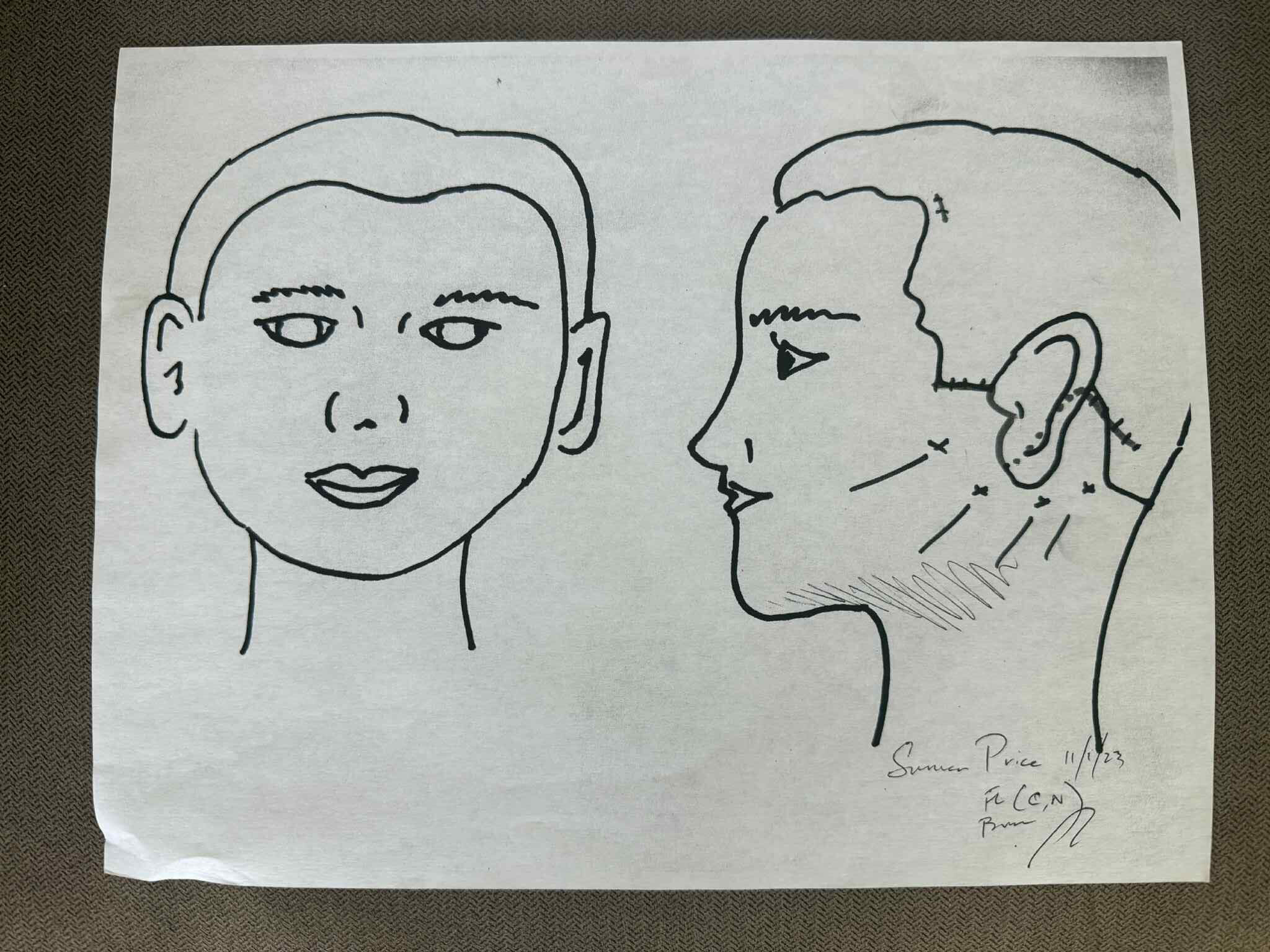
But she said she was concerned with the placement of her incisions and staples.
They did not match the drawing Blackledge provided to her, which showed a few stitches hidden in her hairline and others placed behind her ears but concealed by hair. But the incision behind her ears draped about an inch below her hairline, and there were more staples than she expected.
“So many staples – staples upon staples upon staples,” she said. “There was no rhyme or reason.”
A year and a half later, pearly white scars trailed along Price’s hairline, wrapped around her ears and extended behind them, with white scars dotting areas where staples were placed, photographs show. Her face initially appeared lifted but had mostly returned to its previous appearance after four months, she said.
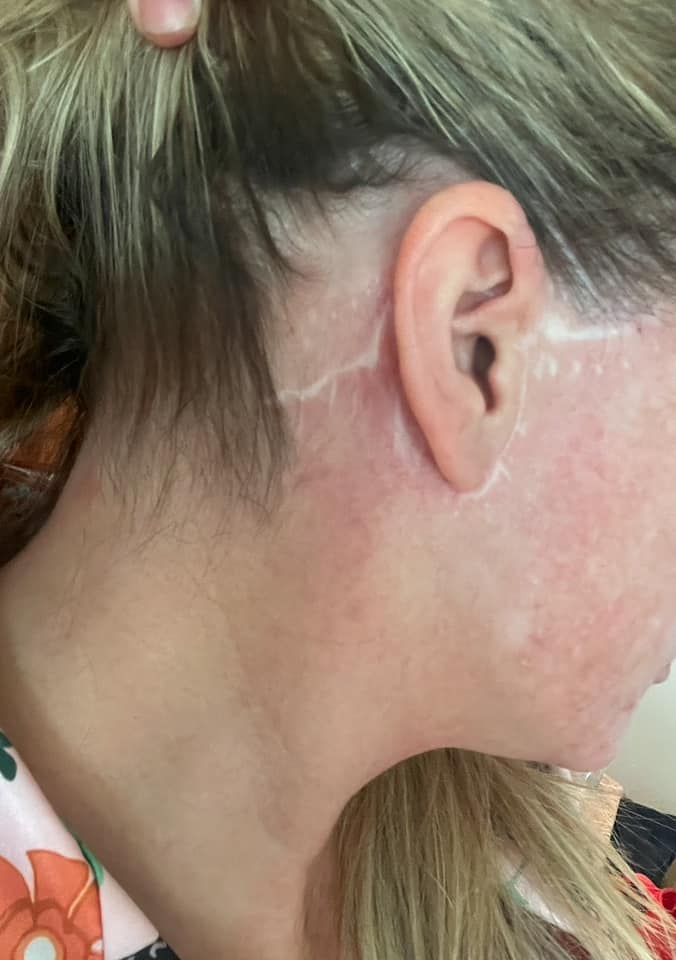
Price said the placement of her scars was debilitating, and she has undergone several scar camouflage tattoo sessions. She stopped wearing her hair up, and didn’t go to the gym for a year and a half because of embarrassment. She doesn’t socialize as frequently as she used to and struggles with a crippling anxiety that she might make the wrong decision.
“I can’t move on from it, because it’s a constant reminder,” she said.
Blackledge said the pictures he has of Price’s scars show an “extremely reasonable result” and emphasized that she was initially satisfied and recommended his practice to friends.
He said that there is no way to avoid the potential of excessive scar formation in any surgical procedure and said he uses techniques during surgery and post-operatively, like creams, to avoid and address scarring.
Frojo, the Virginia plastic surgeon who is one of the directors of The Aesthetic Foundation, said facelift scars are planned to be hidden and shouldn’t be identifiable by someone who doesn’t know they are there. Placing incisions at natural transitions in a person’s skin and proper tension can prevent noticeable scarring, he said.
Most red or sensitive scarring matures within a year, said McIntyre. Abnormal scars, like keloids and hypertrophic scars, may take longer.
Patients signed consent forms, which are typical for such surgeries, acknowledging they discussed the potential risks and complications with Blackledge, including scarring, infection and numbness, that no results were guaranteed and that in rare instances, a revisionary procedure might be required.
“These consent forms constitute documentary proof of the consent process, because memories fade with time, especially when a patient has a result that is less than she was hoping for,” Blackledge said.
Exempt from scrutiny
Anna Ford, now 34, of Poplar Bluff, Missouri, was full of excitement the day of her surgery to slim her nose with Blackledge in 2020. Her nose had troubled her for years, and the procedure was financially out of reach for her in nearby St. Louis, where she said cosmetic plastic surgery is costly.
Her nose was fuller than she had hoped after the procedure with Blackledge, but he offered to revise it at no charge.
After returning to Mississippi in 2021 for a revision surgery, Ford’s nose became red and swollen in winter months and she said she occasionally caught whiffs of a “foul odor.” She said she felt chronically fatigued and depressed.

Nearly three years after the procedure, her nose darkened and became inflamed for weeks before an abscess in her nose burst, leaving an indentation that remains at the tip of her nose today. She said she then realized that the smell had been coming from inside her nose.
“It smelled like death,” she said.
Ford’s revision occurred six days after Hankins’, the rhinoplasty patient who now uses special effects makeup to cover the cavity at the end of her nose. Both women experienced sutures bursting through their skin and have a similar indentation at the tip of the nose.
A slew of doctors’ appointments revealed that Ford had a chronic infection inside her nose. This spring, she underwent surgery to remove the infection after multiple rounds of antibiotics failed to clear it. When it persisted, an infectious disease specialist recommended inserting a long-term intravenous line to deliver antibiotics over a period of weeks.
Three days after it was inserted, she said she felt her energy return. “I was like, ‘Is this what normal people feel like?’” she said. “I was so sick for so long and thought it was depression the whole time. But it was an infection.”
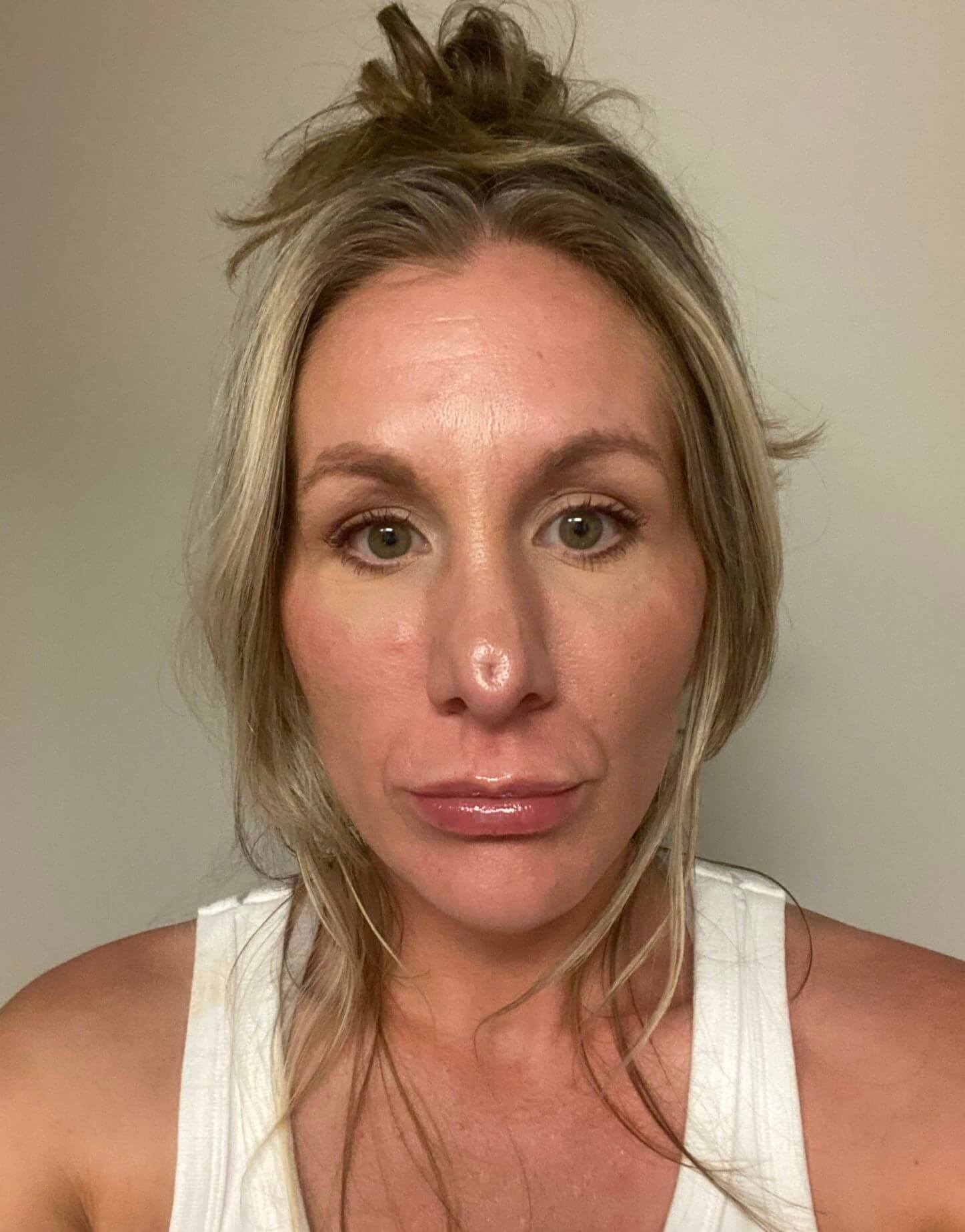
Ford said she has had no feeling in her nose since the 2021 surgery.
Blackledge said Ford removed her bandages sooner than she was instructed to, which resulted in a defect in her skin. He said he could not speak to the subsequent issues Ford has faced, but noted that every surgical procedure carries the risk of infection.
“The fact that an infection occurred post-operatively is not proof of inappropriate care,” he said.
He said Ford sent an intimidating message threatening “karma” to one of his nurses, an example of the “mob mentality” of unhappy patients he has faced. Ford said she sent the message because she is angry and thinks he and his staff are responsible for the infection.
Other patients who spoke to Mississippi Today said they experienced various side effects after surgery, including noticeable scarring, a cheek implant bursting through the skin, a loss of feeling in the neck that has lasted five years, scars that badly itch, and wounds that opened and required further medical attention.
Every surgery carries the risk of complications, or health problems that arise after a procedure. A recent review of 59 scientific articles studying rates of complications in facelifts indicated that unfavorable scarring is the most common and occurs in about 5% of cases.
About 3% of rhinoplasties result in complications, including abscesses, infection and adverse esthetic outcomes, and 15% of patients have revisions, according to a recent paper studying complication rates in rhinoplasties.
Blackledge said he believes his complication rate is far below the national average.
“Given the recognized complication rate in various facial plastic procedures, and the number of procedures I perform each year, I understand there will be patients who are not happy with their result,” Blackledge said. “But that is true for every doctor, regardless of the field.”
He said many problems, like redness and numbness, are not unusual and can be corrected with additional treatments or heal with time. He said he discusses the possibility of undesired scars with each patient and has no recollection of receiving a complaint about an implant bursting through the skin.
Implants and stitches bursting through the skin occur very rarely, but do happen, McIntyre said.
Blackledge said he has never been sued in 22 years of medical practice. Mississippi Today searched state and federal court records and could not locate any suits filed against Blackledge pertaining to patient care.
There is little comprehensive research that clearly demonstrates how frequently cosmetic facial plastic surgery patients are dissatisfied or make complaints after their procedures. One recent article studying a sample of 2,000 patient reviews on social media showed about 8% of reviews were negative, with most citing dissatisfaction with the outcome.
Research shows that high volumes of patient complaints can predict higher rates of medical complications and legal suits, said Dr. Scott Hultman, director of the department of plastic and reconstructive surgery at WakeMed Health and Hospitals in Raleigh, North Carolina. Hultman has conducted research on unsolicited patient complaints made about surgeons to hospitals.
Hospitals can use complaint data to intervene and modify surgeons’ behavior, he said. But there are few avenues for patients to make formal complaints in office-based surgery settings, where private practice surgeons are generally exempt from such oversight.
“That’s one of the loopholes in medicine,” he said. “…They often will escape scrutiny for a while until enough patients complain or there’s a malpractice case.”
Blackledge said there are several avenues for patients to make complaints, including lawsuits and to government agencies.
‘You’re just wanting them to fix it and fix it’
Vicky Pitts, now 55, underwent a neck lift with Blackledge in 2020. Weeks after the procedure, the Laurel resident said she noticed her face drop.
“Everything went sour,” said Pitts, who said it appeared her surgery resulted in no change in her appearance. She reached out to Blackledge about her concerns, beginning a string of revisions and touch-up surgeries that occurred for more than two years.
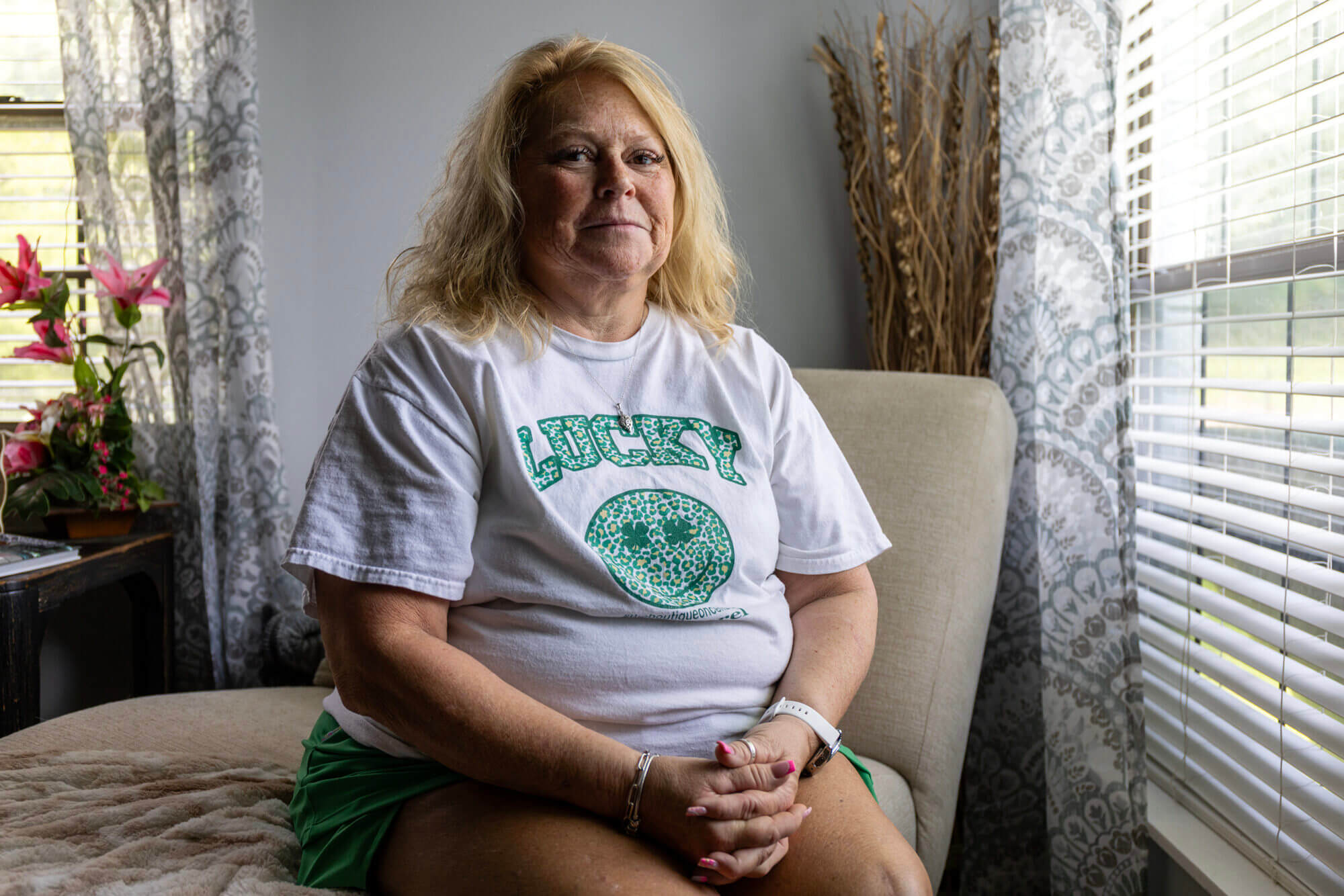
One study estimates that early relapses after facelift surgery occur in about 2% of cases.
Blackledge said his facelifts are conservative and he explains to patients he can always revise them – at no charge – if they are not pleased. He said because adverse outcomes can happen, he makes himself as available as possible to his patients.
He said he also pays for patients’ flights and accommodations for revisions.
“I have done this for over ten years and believe patients appreciate it,” Blackledge said.
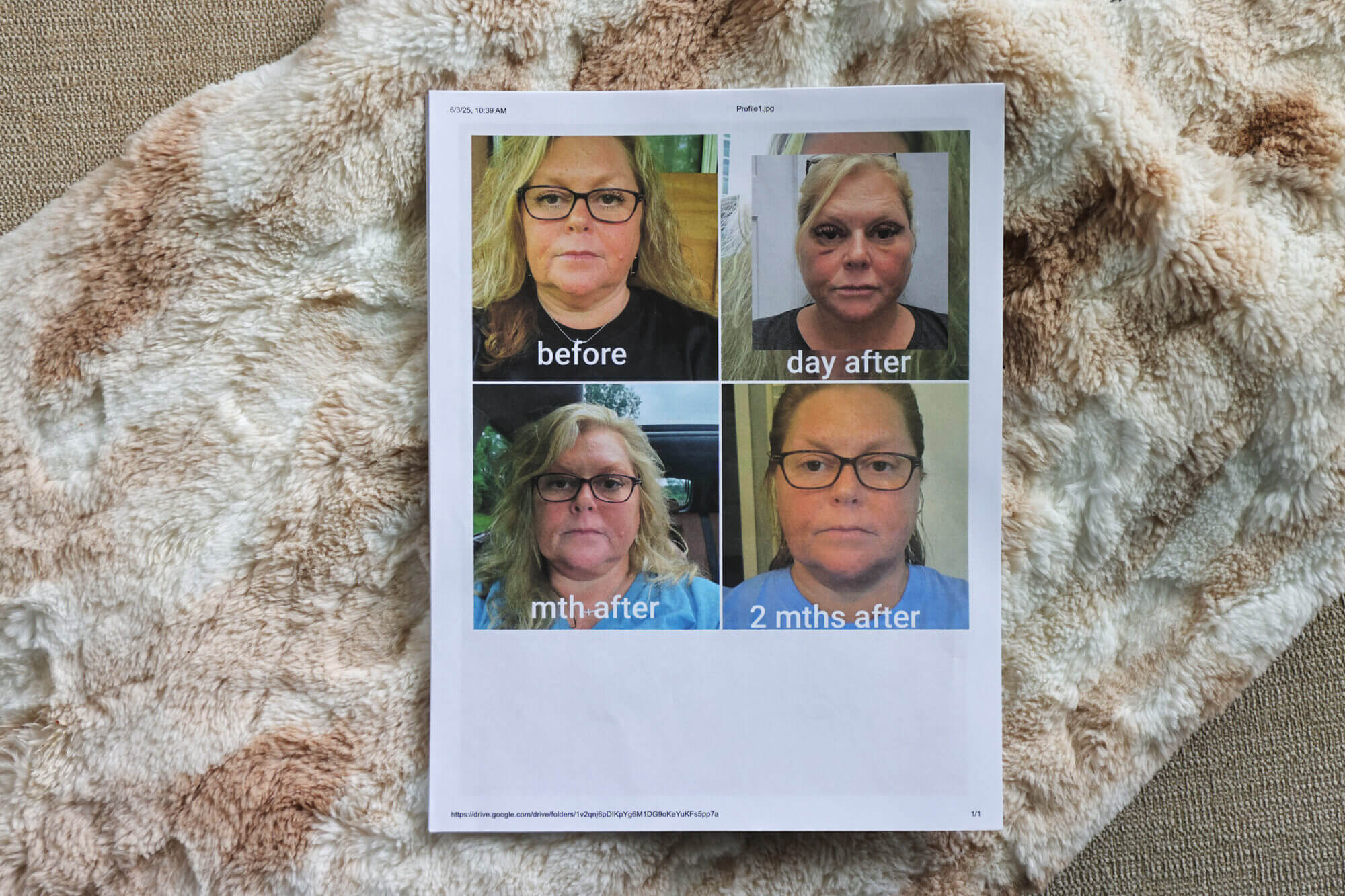
Pitts said she was grateful that Blackledge provided the revisions free of charge, because she couldn’t afford to go to another surgeon after paying for the original procedure.
But some of her revisions came with their own problems, she said. On several occasions, her stitches popped out, leaving incisions gaping open. Once, she went to urgent care to have a wound sutured again.
It was difficult for Pitts to explain why she kept returning, even when she kept experiencing difficulties and wasn’t seeing the results she wanted. She said she felt vulnerable.
“You’re just wanting them to fix it and fix it,” she said.
Social media brushfire
Scores of alleged patients of Blackledge have shared stories and photographs of their surgery experiences in a members-only Facebook group created in 2023.
The concerned patients began reaching a wider audience early this year after sharing images on a public Instagram page that now has over 12,000 followers. Price, an administrator of the page, said she received dozens of messages from former patients.
“It was like a brushfire,” she said. “I couldn’t even keep up.”
Blackledge said he faced no issues regarding his practice until the social media attacks from the past year.
“I didn’t suddenly forget how to do what I was trained to do, and the process and protocols for patient care that I have been using successfully for over 20 years and 12,000 procedures didn’t suddenly become ineffective,” he said.
He said he located social media posts and pictures from people who have never been his patients and that many made inaccurate and disparaging comments.
Some patients said the Facebook group helped them feel less alone.
“I was glad that he didn’t just single me out, because that’s how I felt for the longest,” said Jill Hamilton, now 47, from Nashville, who said she endured discomfort in her face for over a year after Blackledge inserted cheek implants during a 2023 facelift revision surgery – her third revision with him. One implant burst through her skin in 2024, she said.
Blackledge said he was never contacted by Hamilton about the implant bursting through her skin.
On social media, patients encouraged one another to make formal complaints about their care with Blackledge to the Mississippi Board of Medical Licensure.
State medical boards are often one of the only places to lodge complaints against office-based surgeons who are not board-certified, Hultman said, because there is no hospital or credentialing board to which complaints can be reported. It can also be a longer, more cumbersome process.
Price said she was interviewed earlier this year by the board after she submitted a complaint. But five other patients told Mississippi Today their complaints were dismissed by the board or they did not receive a response.
In an email, board attorney Paul Barnes declined to say whether the board is investigating any of the complaints, citing its policy not to comment on pending investigations. Complaints are not public record while a disciplinary investigation is pending and remain confidential if no action is taken.
Sampson, who traveled to Mississippi for a facelift last year, said she saw little change in her appearance and has “horrible scars” from her procedure. Her experience has caused her to lose trust in the medical system, which she believes has done too little to protect her and other patients.
She said it feels that rather than being taken seriously for their claims, she and other patients have been deemed vindictive for sharing their stories.
“That is not the case at all,” she said. “I just don’t want this to continue happening.”
- State fire marshal is investigating troubled Unit 29 at Parchman prison - February 26, 2026
- Mississippi’s Winter Storm Fern losses exceed $107 million, state insurance department says - February 26, 2026
- DNA evidence linked to a Greenville homicide is missing. Now the finger-pointing begins - February 26, 2026